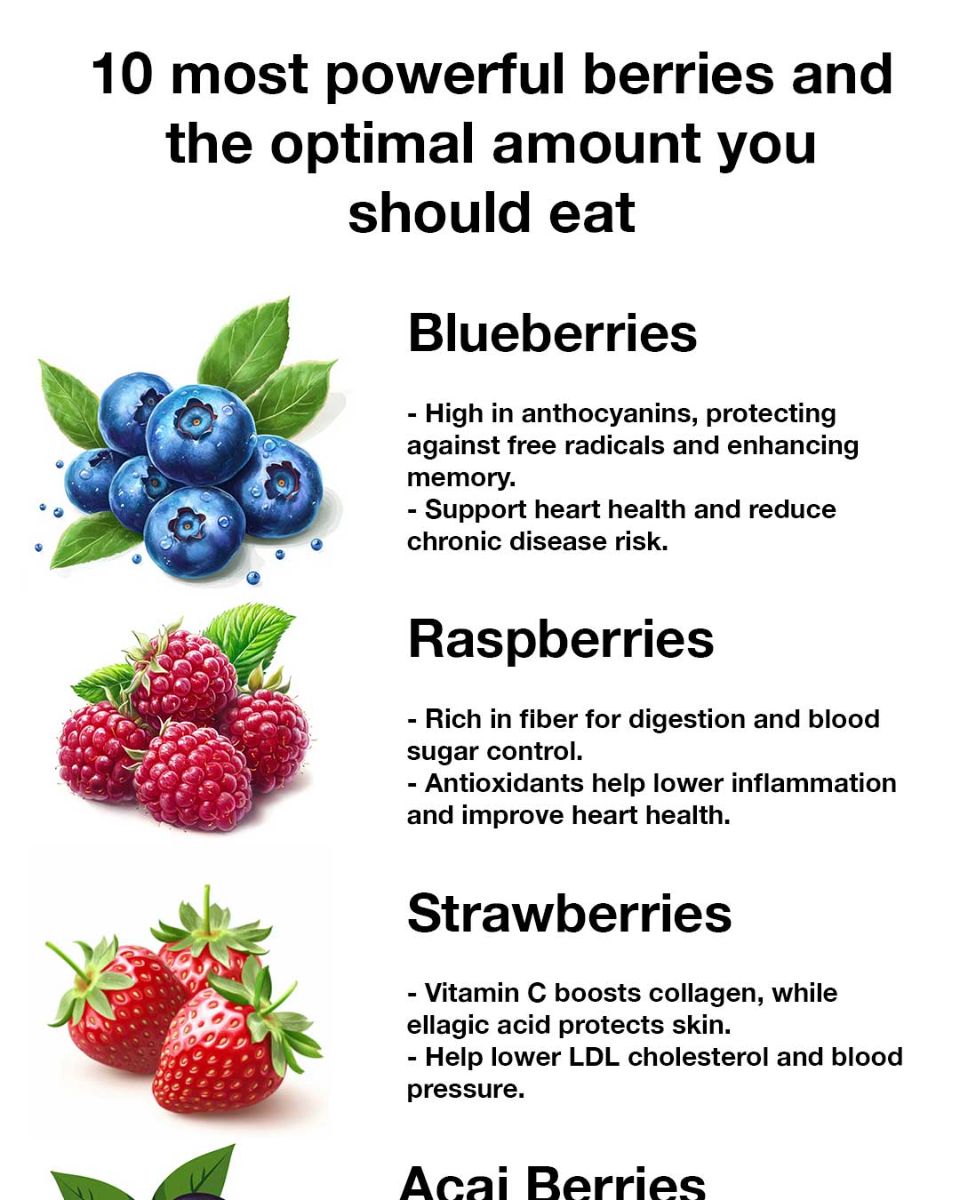10 most powerful berries & the optimal amount you should eat
Morgan Reed
Contributing Writer
Print this recipe
Berries have long been celebrated for their vibrant colors, sweet and tangy flavors, and most importantly, their impressive health benefits. These small fruits are packed with essential nutrients, antioxidants, and phytochemicals that can support overall health and well-being. From boosting the immune system to improving heart health, berries are a versatile and delicious way to enhance your diet. In this article, we’ll explore the top 10 most powerful berries and uncover what makes them so beneficial for your body.
The Nutritional Benefits of Berries
Berries are nutritional powerhouses, rich in vitamins, minerals, and fiber. They are particularly high in vitamin C, vitamin K, and manganese. Additionally, berries are loaded with antioxidants like anthocyanins, quercetin, and resveratrol, which help combat oxidative stress and reduce inflammation. The high fiber content in berries aids digestion and helps maintain a healthy weight by promoting a feeling of fullness. With their low calorie count and high nutrient density, berries are an excellent addition to any diet.
1. Blueberries: The Antioxidant Powerhouse
Blueberries are often referred to as a ‘superfood’ due to their high antioxidant content. They are rich in anthocyanins, which give them their deep blue color and help protect the body from free radicals. Studies have shown that blueberries can improve brain function, support heart health, and reduce the risk of chronic diseases. Regular consumption of blueberries has also been linked to improved memory and cognitive function.
2. Raspberries: Fiber-Rich and Heart-Healthy
Raspberries are an excellent source of dietary fiber, with one cup providing about 8 grams. This high fiber content aids digestion and helps regulate blood sugar levels. Raspberries are also rich in antioxidants and have been shown to reduce inflammation and lower the risk of heart disease. Their vibrant red color is due to the presence of anthocyanins, which have been linked to improved cardiovascular health.
3. Açaí Berries: The Amazonian Superfood
Açaí berries are native to the Amazon rainforest and have gained popularity for their high antioxidant content. They are particularly rich in anthocyanins and flavonoids, which help reduce oxidative stress and inflammation. Açaí berries are also a good source of healthy fats, including omega-3, omega-6, and omega-9 fatty acids. These nutrients support heart health and may help improve cholesterol levels.
4. Strawberries: Vitamin C and Skin Health
Strawberries are an excellent source of vitamin C, which is essential for collagen production and skin health. They also contain ellagic acid, an antioxidant that helps protect the skin from UV damage and reduces the appearance of wrinkles. Strawberries have been shown to improve heart health by reducing LDL cholesterol levels and lowering blood pressure.
5. Goji Berries: The Longevity Fruit
Goji berries, also known as wolfberries, have been used in traditional Chinese medicine for centuries. They are rich in antioxidants, vitamins, and minerals, including vitamin A, vitamin C, and iron. Goji berries are believed to support immune function, improve eye health, and promote longevity. They also contain unique polysaccharides that have been shown to enhance immune response and reduce fatigue.
6. Cranberries: Urinary Tract Health
Cranberries are well-known for their role in preventing urinary tract infections (UTIs). They contain proanthocyanidins, which prevent bacteria from adhering to the walls of the urinary tract. Cranberries are also rich in vitamin C and antioxidants, which support immune function and reduce inflammation. Regular consumption of cranberry juice or supplements can help maintain urinary tract health.
7. Blackberries: Immune System Boosters
Blackberries are packed with vitamins and antioxidants that support the immune system. They are particularly high in vitamin C and vitamin K, which play a crucial role in immune function and bone health. Blackberries also contain anthocyanins and ellagic acid, which have anti-inflammatory and anti-cancer properties. Including blackberries in your diet can help strengthen your immune defenses.
8. Elderberries: Cold and Flu Fighters
Elderberries have been used for centuries to treat colds and flu. They are rich in antioxidants and vitamins, particularly vitamin C and vitamin A. Elderberry extract has been shown to reduce the severity and duration of cold and flu symptoms by boosting the immune system and inhibiting viral replication. Elderberries also have anti-inflammatory properties that can help alleviate respiratory symptoms.
9. Chokeberries: Blood Pressure Regulators
